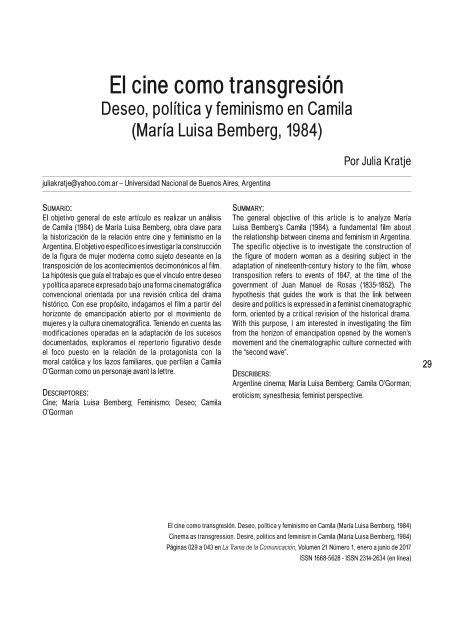Mostrar el registro sencillo del ítem
dc.contributor.author
Kratje, Julia

dc.date.available
2019-01-22T15:27:33Z
dc.date.issued
2017-01
dc.identifier.citation
Kratje, Julia; El cine como transgresión. Deseo, política y feminismo en Camila (María Luisa Bemberg, 1984); Universidad Nacional de Rosario. Facultad de Ciencia Política y Relaciones Internacionales; La Trama de la Comunicación; 21; 1; 1-2017; 29-43
dc.identifier.issn
1668-5628
dc.identifier.uri
http://hdl.handle.net/11336/68370
dc.description.abstract
El objetivo general de este artículo es realizar un análisis de Camila (1984) de María Luisa Bemberg, obra clave para la historización de la relación entre cine y feminismo en la Argentina. El objetivo específico es investigar la construcción de la figura de mujer moderna como sujeto deseante en la transposición de los acontecimientos decimonónicos al film. La hipótesis que guía el trabajo es que el vínculo entre deseo y política aparece expresado bajo una forma cinematográfica convencional orientada por una revisión crítica del drama histórico. Con ese propósito, indagamos el film a partir del horizonte de emancipación abierto por el movimiento de mujeres y la cultura cinematográfica. Teniendo en cuenta las modificaciones operadas en la adaptación de los sucesos documentados, exploramos el repertorio figurativo desde el foco puesto en la relación de la protagonista con la moral católica y los lazos familiares, que perfilan a Camila O’Gorman como un personaje avant la lettre.
dc.description.abstract
The general objective of this article is to analyze María Luisa Bemberg’s Camila (1984), a fundamental film about the relationship between cinema and feminism in Argentina. The specific objective is to investigate the construction of the figure of modern woman as a desiring subject in the adaptation of nineteenth-century history to the film, whose transposition refers to events of 1847, at the time of the government of Juan Manuel de Rosas (1835-1852). The hypothesis that guides the work is that the link between desire and politics is expressed in a feminist cinematographic form, oriented by a critical revision of the historical drama. With this purpose, I am interested in investigating the film from the horizon of emancipation opened by the women’s movement and the cinematographic culture connected with the “second wave”.
dc.format
application/pdf
dc.language.iso
spa
dc.publisher
Universidad Nacional de Rosario. Facultad de Ciencia Política y Relaciones Internacionales

dc.rights
info:eu-repo/semantics/openAccess
dc.rights.uri
https://creativecommons.org/licenses/by-nc-sa/2.5/ar/
dc.subject
María Luisa Bemberg
dc.subject
Camila (1984)
dc.subject
Mujer Deseante
dc.subject.classification
Otras Artes

dc.subject.classification
Arte

dc.subject.classification
HUMANIDADES

dc.title
El cine como transgresión. Deseo, política y feminismo en Camila (María Luisa Bemberg, 1984)
dc.type
info:eu-repo/semantics/article
dc.type
info:ar-repo/semantics/artículo
dc.type
info:eu-repo/semantics/publishedVersion
dc.date.updated
2019-01-09T14:38:10Z
dc.journal.volume
21
dc.journal.number
1
dc.journal.pagination
29-43
dc.journal.pais
Argentina

dc.journal.ciudad
Rosario
dc.description.fil
Fil: Kratje, Julia. Consejo Nacional de Investigaciones Científicas y Técnicas; Argentina. Universidad de Buenos Aires; Argentina
dc.journal.title
La Trama de la Comunicación
dc.relation.alternativeid
info:eu-repo/semantics/altIdentifier/url/http://www.latrama.fcpolit.unr.edu.ar/index.php/trama/article/view/609
Archivos asociados
